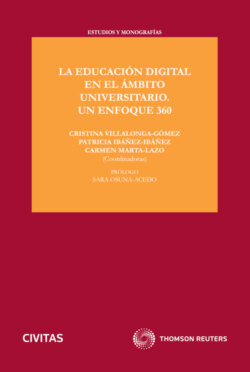Читать книгу La educación digital en el ámbito universitario. Un enfoque 360 - Patricia Ibáñez Ibáñez - Страница 28
На сайте Литреса книга снята с продажи.
VI. REFERENCIAS BIBLIOGRÁFICAS
ОглавлениеAçıkgül, K., y Aslaner, R. (2019). Effects of Geogebra supported micro teaching applications and technological pedagogical content knowledge (TPACK) game practices on the TPACK levels of prospective teachers. Education and Information Technologies, 25(3), 2023-2047. DOI: https://doi.org/10.1007/s10639-019-10044-y
Almenara, J. C., Roig-Vila, R. y Mengual-Andrés, S. (2017). Conocimientos tecnológicos, pedagógicos y disciplinares de los futuros docentes según el modelo TPACK. Digital Education Review, (32), 73-84. DOI: https://doi.org/10.1344/der.2017.32.73-84
Ammade, S., Mahmud, M., Jabu, B., y Tahmir, S. (2020). TPACK Model Based Instruction in Teaching Writing: An Analysis on TPACK Literacy. International Journal of Language Education, 4(1), 129-140. DOI: https://doi.org/10.26858/ijole.v4i2.12441
ANECA (2005). Libro Blanco. Título de Grado en Magisterio. Vol. 1 Disponible en: http://www.aneca.es/var/media/150404/libroblanco_jun05_magisterio1.pdf [Consultado el 8 de junio de 2021]
Baran, E., y Uygun, E. (2016). Putting technological, pedagogical, and content knowledge (TPACK) in action: An integrated TPACK-design-based learning (DBL) approach. Australasian journal of educational technology, 32(2), 47-63. DOI: https://doi.org/10.14742/ajet.2551
Cabero, J., Marín, V. y Castaño, C. (2015). Validación de la aplicación del modelo TPACK para la formación del profesorado en TIC. Revista d´innovació educativa, 14, 13-22 DOI: https://doi.org/10.7203/attic.14.4001
Caldentey, D. (2018). Por qué triunfa la educación universitaria online en España y Latinoamérica puede copiar su modelo. España. Disponible en https://cutt.ly/LunFTLK [Consultado el 17 de junio de 2020]
Cejas, R.; Navío, A., y Barroso, J. (2016). Las competencias del profesorado universitario desde el modelo TPACK (conocimiento tecnológico y pedagógico del contenido. Pixel-Bit. Revista de Medios y Educación, 49, 105-119. DOI: https://doi.org/10.12795/pixelbit.2016.i49.07
Chai, C. S., y Koh, J. H. L. (2017). Changing teachers’ TPACK and design beliefs through the Scaffolded TPACK Lesson Design Model (STLDM). Learning: research and Practice, 3(2), 114-129. DOI: https://doi.org/10.1080/23735082.2017.1360506
Ertmer, P. A., Ottenbreit-Leftwich, A. T., Sadik, O., Sendurur, E. y Sendurur, P. (2012). Teacher beliefs and technology integration practices. A critical relationship. Computers & Education, 59(2), 423-435. DOI: https://doi.org/10.1016/j.compedu.2012.02.001
Fernández-Batanero, J. M., Cabero, J. y López, E. (2019). Knowledge and degree of training of primary education teachers in relation to ICT taught to students with disabilities. British journal of educational technology, 50(4), 1961-1978. DOI: https://doi.org/10.1111/bjet.12675
Gillow-Wiles, H. (2012). Engagement in a Community of Learners as a Mediating Agent Toward the Construction of Technological Pedagogical Content Knowledge (TPACK) in an Online Master’s Program (Tesis doctoral). Oregon State University. Disponible en: https://search.proquest.com/docview/919020969 [Consultado el 8 de junio de 2021]
Gisbert, M., González, J. y Esteve, F. (2016). Competencia digital y competencia digital docente: una panorámica sobre el estado de la cuestión. RIITE. Revista Interuniversitaria de Investigación en Tecnología Educativa, 0, 74-83. DOI: https://doi.org/10.6018/riite2016/257631
Graham, R. C., Burgoyne, N., Cantrell, P., Smith, L., St Clair, L. y Harris, R. (2009). Measuring the TPACK confidence of inservice science teachers. TechTrends, 53(5), 70-79. DOI: https://doi.org/10.1007/s11528-009-0328-0
Gros, B. y Durall, E. (2012). “El tiempo”, una propuesta de integración de las TIC basada en la metodología TPACK. Informe de evaluación. Barcelona: eLearn Center. UOC
Gómez Trigueros, I. M. (2015). El modelo TPACK en los estudios de grado para la formación inicial del profesorado en TIC. Didáctica geográfica, 16, 185-201. DOI: https://doi.org/10.12795/pixelbit.2018.i53.11
Harvey, D. M., y Caro, R. (2017). Building TPACK in preservice teachers through explicit course design. TechTrends, 61(2), 106-114. DOI: https://doi.org/10.1007/s11528-016-0120-x
Koehler, M., Greenhalgh, S., Rosenberg, J., y Keenan, S. (2017). What the tech is going on with teachers’ digital teaching portfolios? Using the TPACK framework to analyze teachers’ technological understanding. Journal of Technology and Teacher Education, 25(1), 31-59.
Liang, J. C., Chai, C. S., Koh, J. H. L., Yang, C. J., y Tsai, C. C. (2013). Surveying in-service preschool teachers’ technological pedagogical content knowledge. Australasian Journal of Educational Technology, 29(4), 581-594 DOI: https://doi.org/10.14742/ajet.299
Mishra, P. y Koehler, M. J. (2006). Technological Pedagogical Content Knowledge: A new framework for teacher knowledge. Teachers College Record, 108(6), 1017-1054. DOI: https://doi.org/10.1111/j.1467-9620.2006.00684.x
Mueller, J., Wood, E., Willoughby, T., Ross, C. y Specht, J. (2008). Identifying discriminating variables between teachers who fully integrate computers and teachers with limited integration. Computers & Education, 51(4), 1523-1537. DOI: https://doi.org/10.1016/j.compedu.2008.02.003
Oner, D. (2020). A virtual internship for developing technological pedagogical content knowledge. Australasian Journal of Educational Technology, 36(2), 27-42. DOI: https://doi.org/10.14742/ajet.5192
Oviedo, H. C. y Campo-Arias, A. (2005). Aproximación al uso del coeficiente alfa de Cronbach; An Approach to the Use of Cronbach’s Alfa. Revista colombiana psiquiatría, 34(4), 572-580.
Rodríguez, A. M., Raso, F. y Ruiz, J. (2019). Competencia digital, educación superior y formación del profesorado: un estudio de meta-análisis en la Web of Science. Pixel-Bit: Revista de Medios y Educación, 54, 65-81. DOI: https://doi.org/10.12795/pixelbit.2019.i54.04
Roig R. y Flores, C. (2014). Conocimiento tecnológico, pedagógico y disciplinario del profesorado: el caso de un centro educativo inteligente. EDUTEC, Revista Electrónica de Tecnología Educativa, (47), a271. DOI: https://doi.org/10.21556/edutec.2014.47.93
Schmidt, D.; Baran, E.; Thompson, A.; Mishra, P.; Koehler, M. y Shin, T. (2009). Technological pedagogical content knowledge (TPACK): The development and validation of an assessment instrument for preservice teachers. Journal of Research on Technology in Education, 42(2), 123-149. DOI: https://doi.org/10.1080/15391523.2009.10782544
Shulman, S. L. (1987). Knowledge and Teaching. Foundations of the New Reform. Harvard Educational Review, 57, 1-22. DOI: https://doi.org/10.17763/haer.57.1.j463w79r56455411
Voogt, J., Knezek, G. (2008). IT in primary and secondary education: Emerging issues. En Voogt, J. y Knezek, G. (Eds.), International handbook of information technology in primary and secondary education (pp. xxixxxxix). New York: Springer Science+Business Media.
Zabalza, A. (2013). Competencias docentes del profesorado universitario. Calidad y desarrollo profesional. Madrid: Narcea.
2.Estudio realizado antes de la emergencia mundial sanitaria
